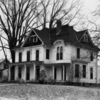Browse Items (15 total)
- Tags: women
Carpenter Apartments
In the 1920s this house, located west of Rice Hall, was owned and operated by Florence Jenny as Jenny's House, a dormitory for women. In 1939 the College purchased it for use as apartments for faculty. In the early 1960s Rice Hall was converted to a…
Tags: 1880s, apartments, brick and mortar, demolished, dormitory, faculty, women
Women's Gymnasium (2nd)
This brick structure, two stories in height, was built in 1881 located south of the Ladies Hall (Second). It was ready for use in September, 1881. The lower floor was used for gymnasium purposes, while the upper furnished dormitory accommodations for…
Thurston House
Thurston House was a three-story home, known for some time as the Knowlton House. The college purchased the home in 1971 from Eloise Thurston Landis Knowlton, daughter of Hiram Thurston. Hiram Thurston was the Treasurer of Oberlin College from…
Tags: collective, demolished, dormitory, late 19th century, women
Pyle Inn
For many years a private dormitory for women, owned by Mrs. Lettie H. Pyle, the property at 158 West College Street was purchased by the College in 1931 and from that time on was operated as a house of residence for women. It furnished rooms for…
Sturges Hall
The erection of Sturges Hall was begun in the fall of 1883, and completed in 1884, on the site across from Talcott Hall and next to the Soldier's Monument (1870, demolished/moved). For a number of years after the completion of Sturges Hall it was…
Lord Cottage
Lord Cottage, named for its principal donor Elizabeth W.R. Lord, originally provided dormitory accommodations for forty women. The dining room offered table board for and additional thirty-five others. The builder, Adam Feick and Brothers of…
Tags: 1890s, boarding house, demolished, dormitory, late 19th century, women
Keep Home
Keep Home was built in 1839. It was the home of Rev. John Keep (1781-1870) and Lydia Keep who owned and occupied the house for many years. In January, 1889, it was donated to the College by Theodore J. Keep and Mrs. Mary A. Keep, "... to be used as a…
Crane Swimming Pool for Women
The Crane Swimming Pool for Women, the gift of Mr. and Mrs. Winthrop Murray Crane, Jr., and their daughter, Barbara, of Dalton, Mass., stands at the entrance to Galpin Field. The architect was the firm of Walker and Weeks of Cleveland. Ground was…
Tags: 1930s, early 20th century, physical education, pool, tile roof, women
Shurtleff Cottage
Shurtleff Cottage (actually a large house) was built on a large parcel of land along the back of Plum Creek by Giles W. Shurtleff in 1892 for his home with his wife Mary Burton and their children. He hired the architects Weary and Kramer of Akron to…
Goodrich House
Goodrich House came into possession of the College in 1932 from the Kindergarten Association. It continued to serve the Kindergarten-Primary Training School through the year 1932-33. The building was remodelled in the summer of 1933 for use as a…
Ellis Cottage
The former home of Professor John Millott Ellis was purchased by the College in 1906. In the summer of 1914 it was remodelled for college purposes and used as a house of residence for women. It accommodated fifteen women, who took their meals…
Dickinson House (1st & 2nd)
Prior to the purchase in 1908 of the private residence property at 166 West College Street, the College had acquired the back ends of lots fronting on West College Street, North Cedar Avenue, and West Lorain Street, and had developed in the area a…
Elmwood Cottage
Built by Professor Giles W. Shurtleff (1831-1904) in 1870, this house passed into the hands of the Kindergarten Association, probably in 1892 when Shurtleff moved to his new house (see Shurtleff Cottage). The Association dubbed it Burroughs Cottage.…
Hales Memorial Gymnasium
The funds for Hales Memorial Gymnasium were given by G. Willard Hales (OC 1900) in memory of his mother, Lina Rosa Hales. It was the first modern gymnasium for women at Oberlin, succeeding several makeshift structures that served multiple purposes…
Baldwin Cottage
The construction of Baldwin Cottage, a small-dorm complement to stately Talcott which rose more or less simultaneously next door, began soon after the 1886 fire which destroyed the Second Ladies Hall. It was named for Elbert Baldwin, a Cleveland dry…















